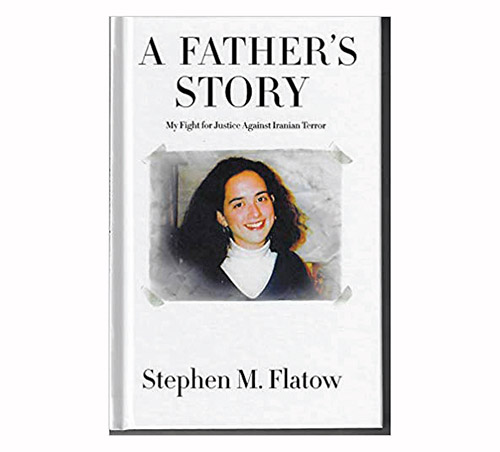
Alisa Flatow HY”D, a Brandeis University honor student taking off a semester to study in Israel, started her journey to the beach in Gush Katif with two friends on the morning of April 9, 1995, when a Palestinian homicide bomber drove a van filled with explosives into their bus, killing Alisa along with seven Israeli soldiers. Islamic Jihad, a militant group with ties to Iran, took responsibility for the bombing. Steven Flatow, her father, began his journey shortly after Alisa succumbed to fatal head wounds at Soroka Medical Center.
Flatow and his wife, Roz, exercised extreme inner strength at this horrible moment and decided to turn the malevolence of Alisa’s death into an affirmation of life. They agreed to donate Alisa’s vital organs—her heart, pancreas, liver, lungs, and kidneys—to save the lives of six strangers. Such donations were very rare in Israel. Israel’s prime minister, Yitzhak Rabin, flew to New Jersey to be menachem avel and thanked them for the gift of Alisa’s organs.
That was the genesis of Flatow’s determination to wring something significant and constructive from the barbarism that had shattered his world. Life is never the same when you lose a child, especially in such a catastrophic way. Roz became more introspective. Steve, always a bit feisty, wanted the people of the world to wake up, to refuse to be intimidated by what happened to Alisa. He embarked on a whirlwind speaking tour for years alerting people to the dangers of Islamic terrorism, established a scholarship fund so others could study in Israel, and writing many op-eds in a variety of print outlets here and in Israel and online. He has become a very articulate writer and powerful speaker, with a pro-Israel and anti-terrorist message that needs to be heard.
He very much wanted the U.S. government to track down and punish the people responsible for Alisa’s murder. Before the Antiterrorism Act of 1996, Americans could sue only individuals, not governments, for terrorist acts committed beyond American soil. The 1996 law, known as The Flatow Amendment to the Foreign Sovereign Immunities Act of 1976, allows lawsuits against the seven nations the State Department says officially sponsor terrorism: Iran, Iraq, North Korea, Libya, the Sudan, Cuba and Syria.
The chronicle of Steve Flatow’s fight against terrorism and American bureaucracy has been put together in a powerful book titled “A Father’s Story” published by Devon Books.
Although I am a close family friend and know the story well, I found the book compelling reading and finished it in one sitting. At times I cried and at times I was angry, but it is a powerful story told well. It is the story of the battle between Flatow and the governments of both Iran and the United States. He may have won the battle, but the victory, such that it is, cannot compensate for what he and his wife have lost.
The book gives us much information about the Flatow family’s history, their increased involvement with Judaism, Alisa’s life and horrible death, and Steve Flatow’s efforts to make Iran pay for the murder of his daughter.
An Iranian group carried out the killing. Iran is a key player in the region but sought to disrupt the Oslo peace talks with terrorist attacks because of their hatred for Israel and the Jews. The book catalogues in detail the nuts and bolts of getting legislation passed so that victims of terror can make a claim against the responsible governments. It also lists the various legislators who pushed for this and were instrumental and supportive of Flatow and what he was trying to do. It also lists those who were not helpful. We get an inside glimpse of how Flatow’s attorneys and supporters worked so very hard, the legal minutia, and the nuances and nexus of international law, politics and money.
Ultimately, in the largest judgment under the 1996 anti-terrorism law, a federal district judge ordered the government of Iran to pay $247.5 million in damages to the Flatow family.
Unfortunately, every administration has gone to court to block the Flatows from receiving any of their award for diplomatic reasons. The family could not tie up any Iranian property here, from bank accounts to airplanes to buildings to treasury bonds, since that might jeopardize American assets abroad. Jamie Rubin, a State Department spokesman, said that this ruling would not affect American policy toward Iran. The best way to resolve differences between the two countries, he added, would be through “direct dialogue.’’
Eventually, a judge awarded the Flatows $22 million (from the U.S. Treasury) for economic loss, pain and suffering, but the balance in punitive damages from Iran is still not collectible. There have been some small victories along the way, and the case is still being pursued in European courts, but the basic injustice still stands.
The most powerful line in the book occurs when Mr. Flatow is asked on the stand by his lawyer at one point if he was the father of Alisa Flatow. He answered no. While everyone was still in shock he said, “I am still her father.”
By Rabbi Dr. Wallace Greene
Rabbi Dr. Wallace Greene is the executive secretary of the Alisa Flatow Memorial Scholarship Fund.













